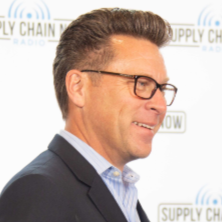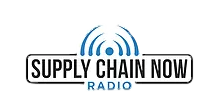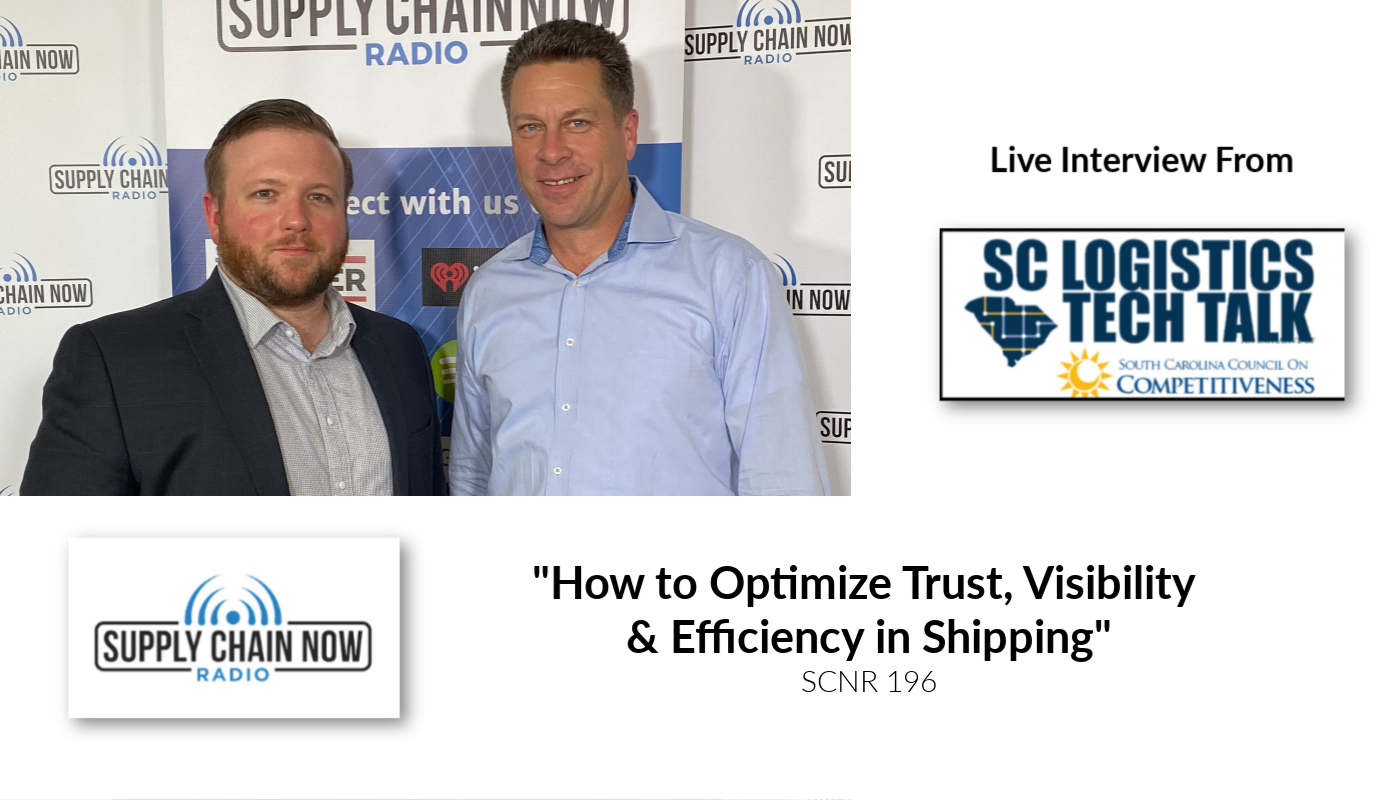Prefer to watch the podcast in action rather than just listen? Watch Scott and Greg as they interview John Monarch for SCNR Episode 196 at the SC Logistics Tech Talk in Charleston, SC.

John Monarch is the co-founder and CEO of ShipChain, a technology startup focused on revolutionizing the freight and logistics industry using blockchain technology. He is a serial entrepreneur in logistics and supply chain coming from the 3PL and E-commerce Fulfillment space, with a background in physics and computer science from Clemson University. Learn more about ShipChain here: https://www.shipchain.io/

Greg White serves as Principle & Host at Supply Chain Now Radio. Greg is a founder, CEO, board director and advisor in B2B technology with multiple successful exits. He recently joined Trefoil Advisory as a Partner to further their vision of stronger companies by delivering practical solutions to the highest-stakes challenges. Prior to Trefoil, Greg served as CEO at Curo, a field service management solution most notably used by Amazon to direct their fulfillment center deployment workforce. Greg is most known for founding Blue Ridge Solutions and served as President & CEO for the Gartner Magic Quadrant Leader of cloud-native supply chain applications that balance inventory with customer demand. Greg has also held leadership roles with Servigistics, and E3 Corporation, where he pioneered their cloud supply chain offering in 1998. In addition to his work at Supply Chain Now Radio and Trefoil, rapidly-growing companies leverage Greg as an independent board director and advisor for his experience building disruptive B2B technology and supply chain companies widely recognized as industry leaders. He’s an insightful visionary who helps companies rapidly align vision, team, market, messaging, product, and intellectual property to accelerate value creation. Greg guides founders, investors and leadership teams to create breakthroughs that gain market exposure and momentum, and increase company esteem and valuation. Learn more about Trefoil Advisory: www.trefoiladvisory.com

In this episode, Scott Luton and Greg White welcome John Monarch to Supply Chain Now Radio the SC Logistics Tech Talk.
[00:00:05] It’s time for Supply Chain Now Radio. Broadcasting live Supply chain capital of the country, Atlanta, Georgia. Supply Chain Now Radio spotlights the best in all things supply chain the people. The technology’s the best practices and the critical issues of the day. And now here are your hosts.
[00:00:29] Hey, good afternoon. Scott Luton here with you, Leive and Supply Chain Now Radio. Welcome back to the show. Now today, we aren’t broadcasting live in Atlanta. We are broadcasting live today from the South Carolina fall. It just six tech talk event and beautiful Charleston, South Carolina at the Gilliard Center. We continue our coverage in partnership with the South Carolina Council on Competitiveness, which, you know, drives this event. And this event really has been highlighting some of the least innovative companies and leaders that are driving the Logistics industry forward and really driving the economy. And in business landscape here, Ford in the booming state of South Carolina. So quick programing note, like all of our series on Supply Chain Now Radio, you can find our replays on a wide variety of channels, Apple podcast, SoundCloud, YouTube, wherever else you get your podcast from. As always, we’d love to have you subscribe so you don’t miss anything. So my esteemed co-host joining me here today once more for the 17th episode of His Life Seems like all good stuff. Yeah. Greg White Serial Supply chain Tech entrepeneur and trusted advisor and board member. Greg, how you doing?
[00:01:33] I’m doing great. This is great. And it it has been a lot of really good information and diverse. It’s what’s interesting is we’re talking about innovation and leadership, but so many of these innovators are the leaders. I mean, we’ve just talked and we’re about to talk to, you know, another early stage company who is doing amazing things in an industry that is ripe for disruption. Yeah.
[00:01:57] Well, said it. And you know what? One of things I’ve liked about the interviews thus far is just that, you know, we were talking to captains and pilots that deal with that infrastructure. We were talking with top talent technology entrepeneurs and are dealing with now how can how they hire. He’s hired better, right. Retain and of course, logistics and transportation and warehousing. All right. All topics. So today, though, to your point, we are going to be interviewing John Monarch, CEO of Ship Chain, which will welcome him, welcome him into the conversation. John, good afternoon. How you doing? Doing great. How are you? Doing great. Read a lot about your organization. You all seem to be on quite a run here and there. You can’t talk about all the customers you signed up here lately. We’re not asked to do so, but looking forward looking forward to getting your take and perspective on on on the this supply chain, which is what we do. Right. So but for starters, John, before we get into talking shop, let’s let’s give our listeners a sense of who you are. So tell us more about where you’re from and your journey that’s led you to leading this organization called Ship Chain.
[00:03:05] Yeah, absolutely. And first off, thank you for having me on the show. I really appreciate that. Originally, I’m from the Chicago area. I moved to South Carolina with my family. The joke is my dad was tired of snow and taxes. So it’s nothing new. Yeah, I went to Clemson University and majored in physics and minored in computer science. Go Tigers. Since then, I got into the e-commerce world and one of the biggest problems that a lot of my friends in e-commerce were facing was shipping. So how does, you know, fulfillment work? What good? All that type of, you know, problems they were having with delays, with just incorrect cargo coming in for them from inbound side of things. I got into it and I started a fulfillment center without having ever been in the shipping industry in my life. My dad worked. You know, he did get a trucking company a long time ago. But that experience didn’t transfer over to me, of course. So you got to make a lot of fun mistakes in the process and got a crash course.
[00:04:00] And, you know, I think that that’s the beauty of Supply chain. We need these outsiders.
[00:04:04] I think that was a term we were using yesterday as we were driving down here naive and crazy.
[00:04:11] And I even. All right.
[00:04:12] I mean, it takes it takes a little bit of naivete and craziness to to make changes in an industry. It really does.
[00:04:18] It does. And John, I can only imagine in that earlier stage, since, as you put it, whatever your dad knew didn’t carry over one more generation, I bet, in your your efforts to make it happen. You learned a ton of things, both from your successes as well as critical lessons from your failures, right? Oh, absolutely.
[00:04:36] I mean, just even having customers yelling at you for things that are completely out of your hands, you know, containers that just literally go, disappear, arrive three weeks later and all of a sudden, you know, you’re on the hook for a giant bill. So and you know, and you’re speaking to all the curveballs and the fires that that take place in Supply chain, whether you’re, you know, the global e-commerce providers and the.
[00:04:59] Retail or your startup? That’s what Supply chain is tasked with doing. Solving problems and putting out fires. So what led you to kick into starting schipp chain?
[00:05:10] It really was that visibility problems. So when we had that container disappear and we all of a sudden had to pay, you know, giant detention fees for release and we didn’t know where it was, we couldn’t prove that. So that was really kind of the impetus of it here. Why can I track a pizza that’s come into my house, but I can’t track a half million dollars worth the inventory? That just seems absurd, right?
[00:05:31] It is absurd. Right. Oh, I agree with you completely. It’s totally absurd. You’re making such a great point as Best Buy out here. So.
[00:05:40] And y’all you’ve been hard at work in the trenches. For how long? We were founded in twenty. Seventeen. Okay. And our offices are primarily in Greenville, South Carolina.
[00:05:48] Okay. And we’re CEO of the organization. You know, we all know different CEOs wear different hats. Some some, you know, double down on the growth and biz dev side. Some are all about, you know, the product of the operation Ryder, you name it. Where do you spend your time?
[00:06:04] It’s all the hats that you just mentioned, honestly. So, I mean, in on the sales and business development side, I’m on the product side even sometimes reviewing code so that computer science minor comes in a little handy occasionally.
[00:06:15] I don’t profess to be the best bet or not, but your developers would have something to say about. They would? Yeah. They would kill me when I get back in it. So I’m definitely not the best, that’s for sure. But product wise, I mean, I think that that’s probably where I spend the most time.
[00:06:29] So on your Web site, Nishina, you had some key problem areas defined by one of the big four. What? Speaking to the core of what ship chain does. Obviously, visibility is a big, big thing that you’ll deliver. What else would you think ship chain delivers for its customers?
[00:06:49] Accountability. So that’s one of the biggest failures we’ve noticed in Supply chain, is that the fact that I don’t know necessarily who it was accountable for my shipment at a specific point in time and location and that most of the problems actually happen where there’s a handshake. So that way, how can we prove who was responsible for it? Who do I need to make an insurance claim against who or who needs to pay for this when everyone is just pointing fingers at each other and nobody will claim it. So that way we can provide is a lot more granularity and accountability as a result of that visibility that will hopefully reduce things like insurance claims, insurance premiums and damage shipments. So how do you do that for people so we can show a location that is timestamped and notarized that can’t be tampered with? That using blockchain for that? Exactly. Blockchain is perfect for being able to record events that happened without having to worry that they’ve been tampered with since it’s impossible to tamper with. We can show that in an effective notarization.
[00:07:51] It’s an inalterably record. Right. So, I mean, that provides the surety and the accountability that you’re looking for. Right. Right. And that’s a great use of it. By the way, we talk a lot about on this show in particular, we talk a lot about A.I. and Supply chain. It’s good. I as a technologist myself, I’m relieved and excited to hear someone who has figured out an application for it and is applying it right because that is an absolute great use for it.
[00:08:18] That’s definitely the biggest problem that we had for a while was, you know, 2017. Everyone was talking about it. Everyone had hyped it. Yeah. And then no one can find a specific use case. Twenty eighteen. You mentioned it in a conference and people are rolling their eyes. Yeah. Twenty nineteen. Now we’re at the point where the use cases are being clearly identified and the purpose for it is there. It’s just getting people back out of the eyeroll mindset into the interest in the technology. Yeah, the eyeroll mindset.
[00:08:46] That’s a good way but it is good you know like ya both speaking to it brings and bakes more trust into the overall process. And if we need anything in today’s environment in general, it’s more trust in the institutions and the processes and enterprises that make the business roll happen. So I like that. And I’d also like to your point, John, that the practicality is just how practical of an application you are using. You know, in it used it for some of you gave a keynote earlier. So let’s talk about some of the key. First off, what did you speak to? And then secondly, we love to kind of get some of your what you would consider some the key takeaways from your presentation.
[00:09:27] So really, it was presenting the use case, being able to show accountability and visibility in a shipment, document management being able to certify and notarized those documents, such as a bill of lading, being able to have digital originals, I think is a huge deal. Well, right now, a bill of lading, you know, new rules are making it so that you can have a digital transfer of a bill of lading rather than having to ship around for couriers and paying $150 and, you know, FedEx or DHL fees for that. But now having digital originals is something that we’ve never. Considered, but it is possible with blockchain. In a sec. A real take away of it is that we made the right focus on user user interface and usability. I like to say that a lot of Supply chain software, Logistics software because it was neglected by the tech world for so long. It was built by engineers for engineers. And it’s a pain to use and it’s just not enjoyable. It’s not something that I can go on. And you know, we like to joke in in in sales presentations that we could teach our grandparents how to use our system in 5, 10 minutes rather than spending 2 weeks of training and, you know, hundreds of thousands of dollars on that and having, you know, one of our one of our key hires, we think was a user interface expert. So that way we can make it something that people enjoy using. You know, you you go on Facebook or Instagram, it’s quick and easy to use. You use your iPhone quick and easy. Why isn’t shipping software like that? Yeah, great.
[00:10:54] I think that’s a key to software and technology in general in the future. Look, I mean, we always talk about our grandparents, right, or or whatever. But the truth is that in the current and incoming generations are impatient. People used to technology doing things for them in a simple way and and being able to make it so that anyone can use it not only benefits you today because there are still people in the in the workforce that aren’t as familiar with technology. But it also builds a great foundation for the incoming generations who expect technology to do so much more to be as easy as your iPad or phone.
[00:11:33] Exactly. It reduces that friction and that barrier to entry. And there’s just fun to use almost. There’s really no reason for it to be any way otherwise.
[00:11:41] Right. Exactly. Mm hmm. We love our complexity. That’s a big me now. During that good occupation, I love simplicity.
[00:11:51] So let’s talk about we’ve already touched on the necessity of visibility and transparency. So I feel like if we talk more about that, we’re gonna be beaten that dead horse. Let’s gonna switch gears and let’s go broader. Let’s talk about, you know, what are some of the other global indie in Supply chain news issues, trends, you name it. What’s on your radar more than others lately?
[00:12:16] Food. That’s a big one. And it’s interesting because a lot of our food discussions with clients and just in general came around last year when there were those two romaine lettuce recalls. Why is it that we had to throw every head out and just wait for, you know, a new batch to come in rather than being able to isolate where the problem came from? Right. So granularity in shipments is critical along with that data such as temperature. I mean, we’re we’re coming to a point where every truck has all these sensors on it, but there’s a problem with having them all talk to each other. So we like to say everyone’s talking, but not to each other. So one of the pilot projects we did, they had something like seven different g._p._s and cellular systems that are all talking to their private servers but not communicating with each other.
[00:13:00] So that’s where we see an advantage of bringing everything together and making it much clearer what’s going on in that in this IAPT age that that platforms and talking to other platforms of, pardon me, a growing challenge because everything is its own system these days. Right. And that and in the fact of and I believe I’m not sure which of our earlier guest mentioned that, but your sensors and data being collected on everything. You know what? My favorite examples and this is, you know, per year and a half old was when lobbying was putting sensors in coats and shoes, I believe was the second item to to gather a sense of when users are using and what temperatures and how often they’re being watched and things.
[00:13:43] That to me is just fascinating. It’s terrifying, isn’t it? It is. It might be terrifying, but but going back to your point, in this day and age where technology is making our lives easier, having these systems talk to each other is so paramount. Right? Right. Oh, absolutely. And that’s where we see a blockchain coming in very handy as being that communications layer between all of these devices that aren’t necessarily talking to each other. So they can talk to that single layer. And anyone who needs it can access that information and validate that it’s true, rather than having to go to 17 different, you know, cloud systems and servers. Right. Okay.
[00:14:23] So let’s make sure that our listeners can can learn more. So if if our listeners here heard anything that that they want to learn more about and learn more about ship chain, where do they go?
[00:14:35] They can go to ship chain dot IO, that’s S-H IP see HHI and Dot Io. That’s kind of a strange ending there. But our blog has tons of info and that’s what defines you as a startup, but not I. Oh yeah. Even though it means the Indian Ocean. Funny enough, better, you know. Yeah. Check out our blog. It’s linked on the website. Follow us on Twitter just at ship chain. We’re happy to answer any questions, and if anyone ever wants to learn about it, you can sit and talk to us anytime.
[00:15:04] Yeah, terrific. So events any any upcoming at all active on the events? You know, we’ve talked a lot about Moto X through all these conversations. Reverse Logistics Association. Yeah, CSC mpw picks any rela. Yeah. S right. Any other upcoming events coming up on your calendar?
[00:15:22] Bunch JSOC events we’re looking at. You know, we always look at like a TPM. We we had people at the Logistics Technology Conference that JSOC just recently hosted in Las Vegas. Yeah, CSI Tempe as well. Those have been great for us and it’s always just a pleasure to attend because everyone’s got questions.
[00:15:38] Absolutely. You know, you’re able to build out your network and and you know that interconnectivity, which has been a big common theme, I think, of all of our conversations down here at an event that’s built to drive interconnectivity with amongst the different players industry. Really, really important. Well, big thanks to John Monarch, CEO with Ship Chain. Really enjoyed it. You’re such a down to earth and approachable entrepreneur and CEO of an organization. So I challenge to keep that, you know, cause you’ve pulled people to you. So that and and it’s just so high. Explain things. Yeah, I bet my my fifth fifth grader could understand maybe my first grade. I don’t know. But love that level what you are doing. And congrats on your success to this point and good luck moving forward. I really appreciate that. And thank you so much for having me on today, gentlemen. All right. Thanks so much, John. All right. So to our listeners, stay tuned as we continue our coverage of the 2019 South Carolina fall Logistics tech talk. Be sure also to check us out on all the podcast channels, including Apple podcasts, our heart radio, YouTube, you name it. Of course, you can find past episodes and upcoming events. We’re gonna be at Supply Chain Now Radio dot com. So on behalf of Greg White and Scott Luton and really the entire Supply Chain Now Radio Supply Chain Now Radio gang. Have a wonderful day and we’ll see you next time on Supply Chain Now Radio. Thanks, everybody.
Upcoming Events & Resources Mentioned in this Episode
Learn more about the SC Council on Competitiveness: https://sccompetes.org/
Connect with John on LinkedIn: https://www.linkedin.com/in/johnmonarch/
Connect with Greg on LinkedIn: https://www.linkedin.com/in/gswhite/
Connect with Scott on LinkedIn: https://www.linkedin.com/in/scottwindonluton/
eft Logistics CIO Forum in Austin, TX: https://tinyurl.com/y5po7tvw
SCNR to Broadcast Live at CSCMP Atlanta Roundtable Event: https://tinyurl.com/y43lywrd
Reverse Logistics Association Conference & Expo: https://rla.org/calendar/1
SCNR to Broadcast Live at MODEX 2020: https://www.modexshow.com/
2020 Atlanta Supply Chain Awards: https://www.atlantasupplychainawards.com/
SCNR on YouTube: https://tinyurl.com/scnr-youtube
The Latest Issue of the Supply Chain Pulse: https://tinyurl.com/y6rv76ss
Check Out News From Our Sponsors
The Effective Syndicate: https://www.theeffectivesyndicate.com/blog
Spend Management Experts: https://spendmanagementexperts.com/
APICS Atlanta: https://apicsatlanta.org
TalentStream: https://talentstreamstaffing.com/
Verusen: https://www.verusen.com/
Georgia Manufacturing Alliance: https://www.georgiamanufacturingalliance.com/
ProPurchaser.com: https://tinyurl.com/y6l2kh7g
Supply Chain Real Estate: https://supplychainrealestate.com/
Vector Global Logistics: http://vectorgl.com/






